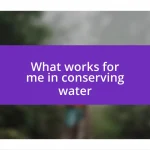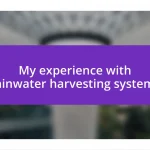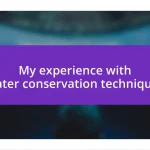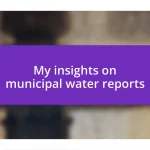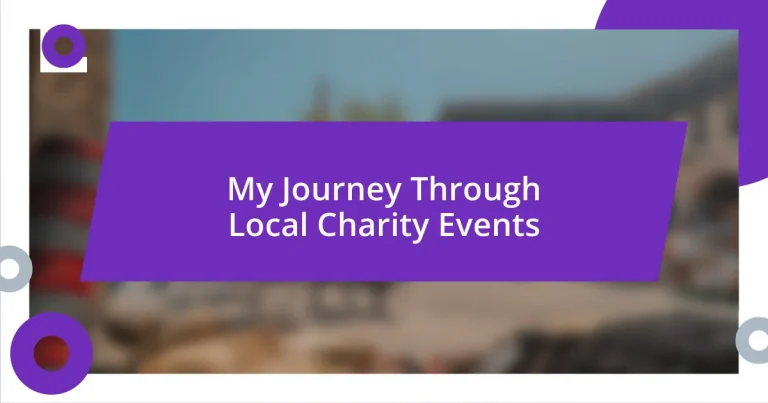Key takeaways:
- Local charity events create strong community bonds and foster personal growth through shared experiences and collaboration.
- Effective engagement involves building genuine connections and creating a welcoming atmosphere to inspire participation and belonging.
- Evaluating the impact of charity events goes beyond financial measures, focusing on the relationships formed and the motivation ignited for future involvement.
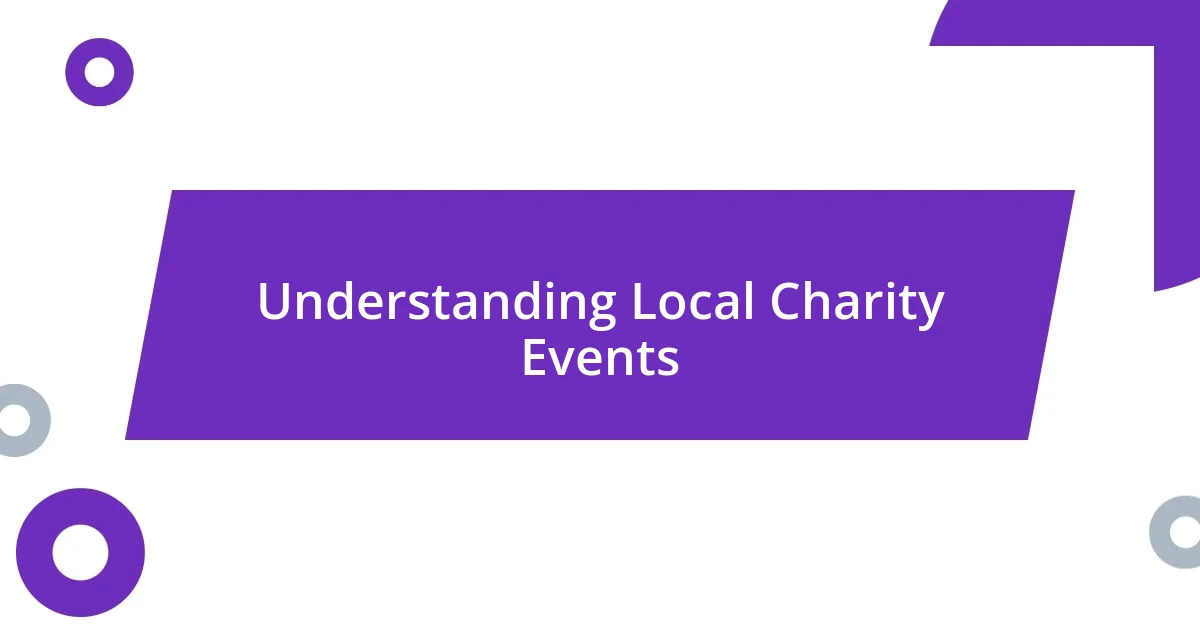
Understanding Local Charity Events
Local charity events are often fueled by a community’s passion for change, and this personal connection makes them powerful. I remember attending a small art auction one rainy evening, where every piece told a story of struggle and resilience. How incredible is it to see creativity harnessed for a greater cause, touching hearts and inspiring action?
As I navigated through my first charity run, surrounded by spirited participants, I felt a palpable energy in the air. Each runner wore their cause like a badge of honor, and I couldn’t help but ask myself, what motivates people to contribute their time and effort? That sense of camaraderie was overwhelming and reminded me that we’re not alone in our journey; we’re part of a collective effort striving for positive change.
These events serve as a bridge between local needs and community support. I once volunteered at a food drive, and the sheer gratitude of those we helped struck a chord with me. It made me realize that understanding local charity events goes beyond mere participation; it’s about recognizing the impact we can have on one another’s lives.
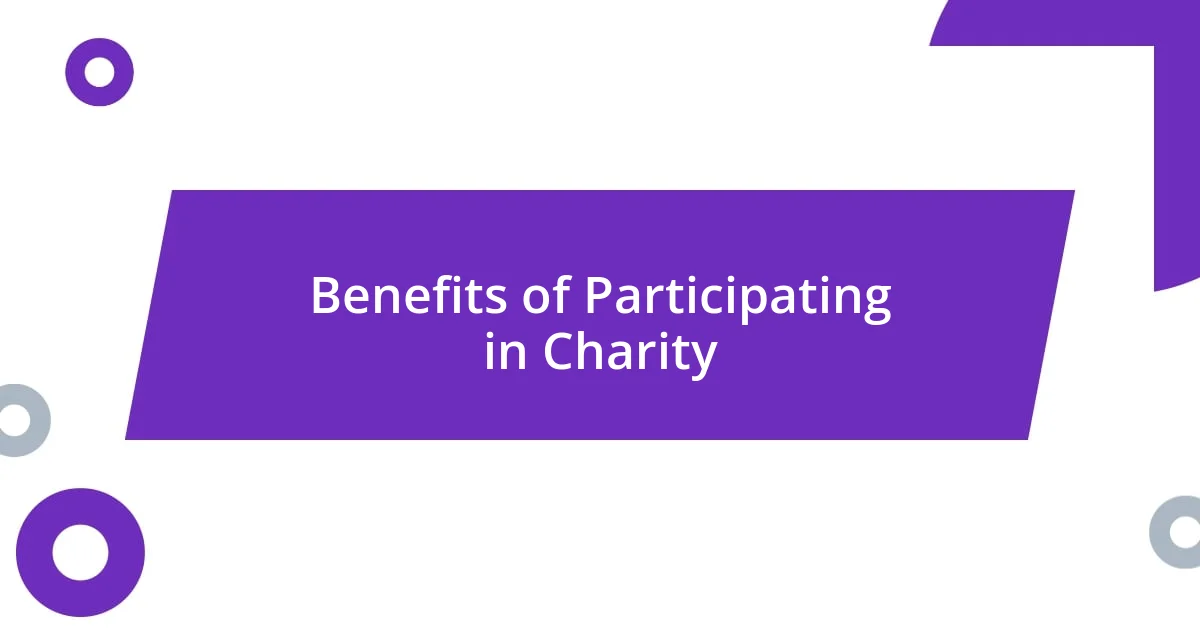
Benefits of Participating in Charity
Participating in charity offers a wealth of emotional and experiential benefits. I vividly recall my first volunteer shift at a local soup kitchen; witnessing the smiles of those we served filled me with a sense of purpose I hadn’t anticipated. It was a powerful reminder of how giving back can transform not only the lives of others but also our own perspectives on gratitude and humility.
Here are some of the key benefits of participating in charity:
- Strengthened Community Bonds: Engaging in local events fosters a sense of connection. You realize you’re part of something larger.
- Personal Growth: Volunteering challenges you; I found myself stepping outside my comfort zone, developing new skills and confidence.
- Increased Empathy: Interacting with diverse individuals helps cultivate understanding and compassion. I’ve learned to appreciate the stories behind each face I see.
- Boosted Mental Health: Helping others genuinely uplifts your mood—there’s something about selflessness that rejuvenates the spirit.
- Networking Opportunities: Charity events are fantastic venues for meeting like-minded individuals, expanding both personal and professional networks.
Each event I participated in brought me closer to understanding not just the causes themselves, but also the incredible community of support surrounding them. It’s a journey of connection that goes beyond the act of giving.

Planning My First Charity Event
Planning my first charity event was both exciting and overwhelming. I remember sitting at my kitchen table with a cup of coffee, brainstorming ideas and nervously pacing back and forth. The thrill of envisioning an event that could bring people together for a cause I deeply cared about filled me with a sense of purpose. I had so many questions racing through my mind: What type of event would resonate? How could I engage the community effectively?
Creating a solid plan became my lifeline. I meticulously outlined the event’s goals, potential venues, and ways to encourage participation. I quickly realized that collaboration was crucial; reaching out to local businesses for sponsorships turned into a wonderful bonding experience. Their support not only helped financially but also reinforced the idea that we were all in this together. I felt a surge of energy every time someone agreed to contribute; it was a beautiful reminder of the community spirit that drives charity.
Below is a comparison of different aspects I considered while planning the event:
| Aspect | Considerations |
|---|---|
| Type of Event | Fundraising Dinner vs. Fun Run |
| Audience Engagement | Interactive Games vs. Speaker Presentations |
| Budget | Sponsorships vs. Ticket Sales |
| Location | Indoor Venue vs. Outdoor Space |
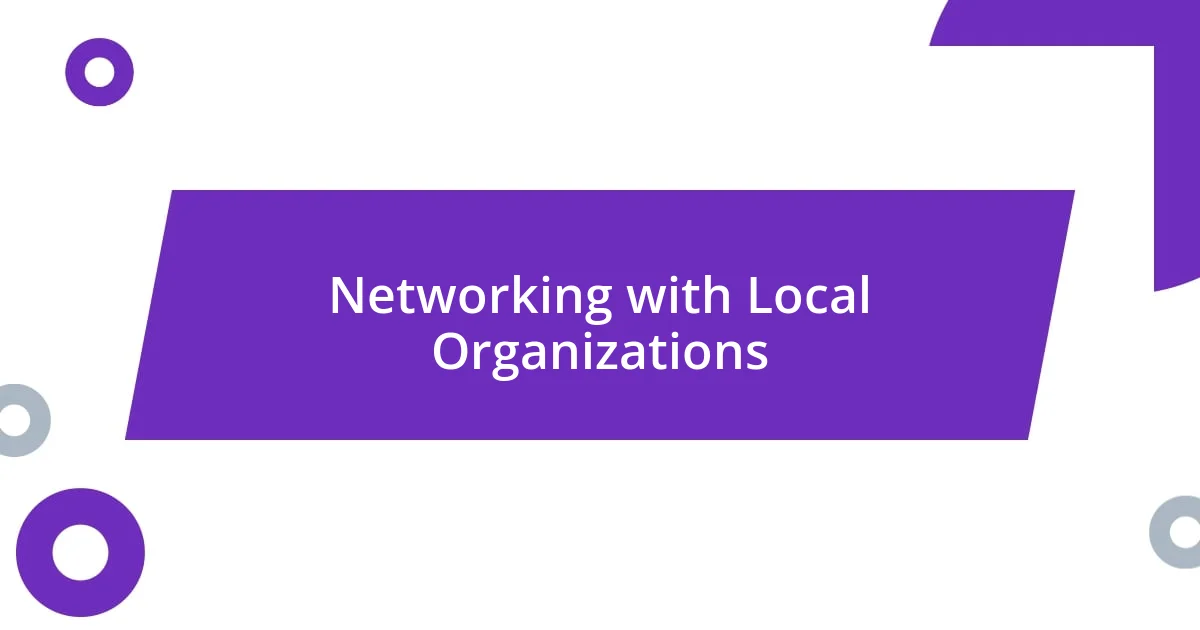
Networking with Local Organizations
Networking with local organizations can truly enhance your charity experience. When I first attended a community fundraiser, I was pleasantly surprised by how open everyone was to connection. Striking up conversations over shared interests cultivated relationships that extended beyond that single event.
One of my fondest memories involves meeting a local nonprofit director. During a quick coffee break, I expressed my admiration for their work, and to my delight, they invited me to a planning meeting. This opportunity taught me that taking the initiative to engage can lead to profound collaborations. Have you ever thought about how a simple conversation can open doors you never knew existed?
Building relationships with these organizations allows you to exchange resources and ideas that amplify your impact. Through attending workshops and joint events, I’ve found that networking isn’t just about expanding connections; it’s about fostering a community united by a shared mission. Engaging with local groups inspires fresh perspectives and ignites innovation, making every interaction feel like another step toward meaningful change.
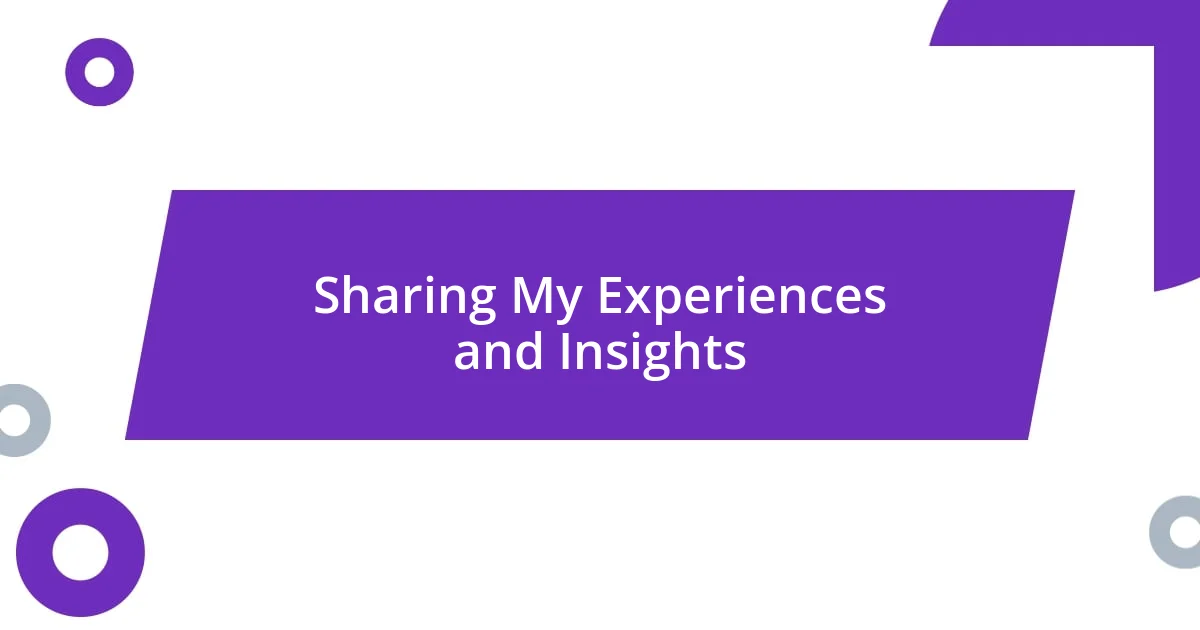
Sharing My Experiences and Insights
Attending charity events has been a transformative journey for me. I remember one particularly vibrant evening at a local art gallery fundraiser. The energy was palpable; people were not just donating—but sharing their stories, too. It hit me that every person attending had their own reasons for being there, each motivated by personal experiences and connections. Have you ever found yourself in a room full of strangers, yet felt an undeniable bond over a shared purpose? It’s an incredible feeling.
Over time, I’ve learned that each event offers a unique lesson. I once volunteered at a charity run that was a logistical nightmare. We faced unexpected rain and a shortage of volunteers. Instead of despairing, we rallied together, adapting our plans on the fly, turning obstacles into opportunities for creativity and teamwork. That day, I realized the depth of resilience that community members can exhibit when united by a cause. It’s a reminder that it’s not just about the outcome, but the journey we take together along the way.
Reflecting on my experiences, it’s clear that vulnerability plays a key role in connecting with others. I made a point to share my personal reasons for supporting a specific cause, and to my surprise, it sparked deeper conversations with attendees. This openness has been a game-changer; it’s encouraged others to share their stories too. I often wonder: how powerful could our impact be if we all embraced that vulnerability in our conversations? The more we share, the more we connect, fueling the communal spirit that is so vital in charity work.
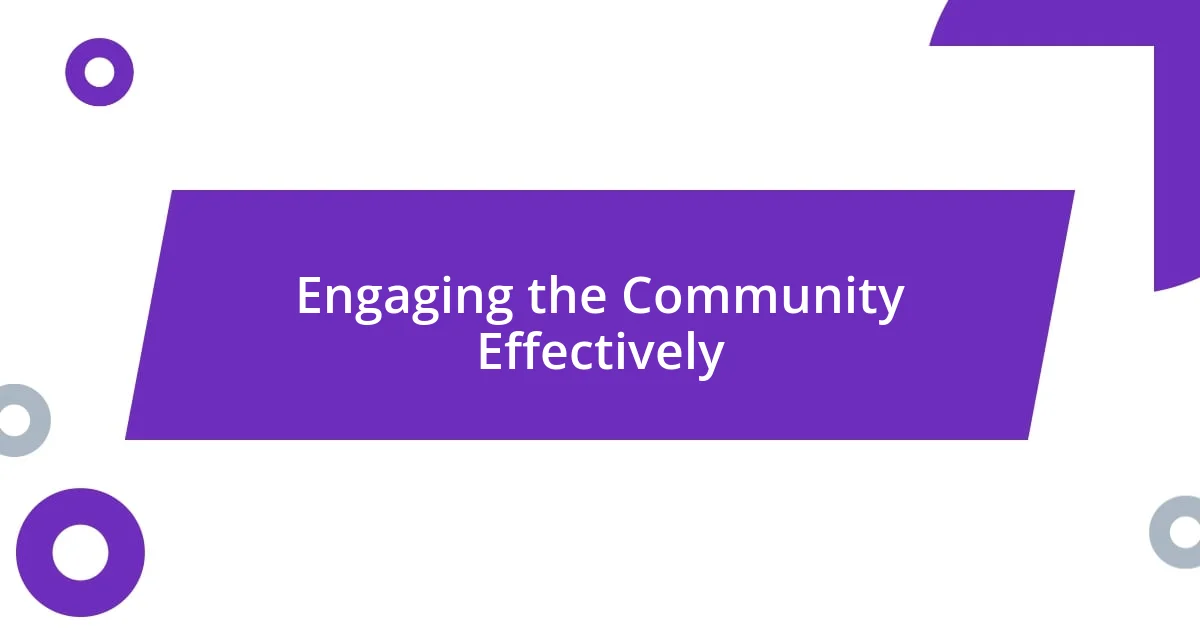
Engaging the Community Effectively
Engaging the community effectively goes beyond mere participation; it demands genuine investment in the people around you. I recall a particularly moving experience at a community garden project. Together with local families, we dug, planted, and shared laughter, turning a simple Saturday into an occasion filled with joy and purpose. Isn’t it fascinating how shared physical work can forge connections that words often fail to do?
Every interaction presents an opportunity to uplift those around you. At a fundraiser last summer, I decided to approach not just the organizers, but also the attendees. By asking questions about their motivations for attending, I discovered so many beautifully unique stories. This approach deepened my appreciation for the diverse tapestry of our community. Have you noticed how illuminating a simple inquiry can be in revealing the heart behind a person’s commitment?
I’ve found that creating a warm and welcoming atmosphere is crucial for community engagement. One time, I organized a casual meet-and-greet before a charity event, providing snacks and a relaxed vibe. The result? An exciting exchange of ideas where community members eagerly discussed not just their donations, but also new initiatives they were passionate about. It reminded me that when we prioritize connection, we not only inspire participation; we cultivate a sense of belonging, essential in fostering long-lasting relationships. How has connection impacted your own experiences in community events?
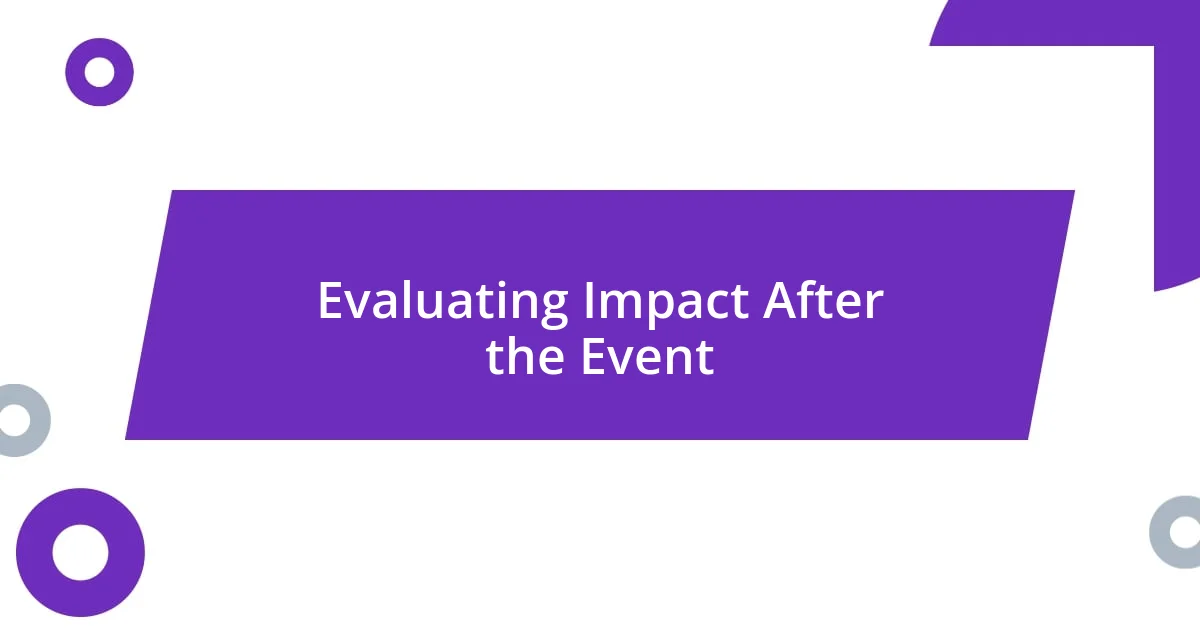
Evaluating Impact After the Event
Evaluating the impact of a charity event can often be as vital as the event itself. After one memorable gala, I gathered with the team to discuss what we had achieved. While we could easily quantify the funds raised, I was more interested in the stories that emerged. Did our guests leave feeling inspired? Were connections made that might blossom into future collaborations? These reflections helped us see that the event wasn’t just a fundraising effort; it was a moment of community sharing.
I often take note of the feedback we receive post-event. At a recent charity walk, I was surprised by how many participants reached out to share how the experience had transformed their perspectives on volunteering. It’s heartwarming to hear that our efforts not only met their immediate needs but also ignited a passion for further involvement. This reinforces my belief that the true measure of success lies in the relationships we cultivate and the motivations we inspire—how many people are now eager to take their first step into community service because of that one event?
I’ve also experienced the power of follow-up. After hosting a workshop aimed at educating people about a local cause, I consistently emailed attendees to thank them and share the impacts of their support. One individual responded, revealing how our discussion pushed them to advocate for change in their neighborhood. When I read their words, it struck me that a single event can ripple far beyond that day. Isn’t it remarkable how the seeds we plant can grow into movements? This kind of evaluation helps me appreciate the true legacy of each occasion we share.



